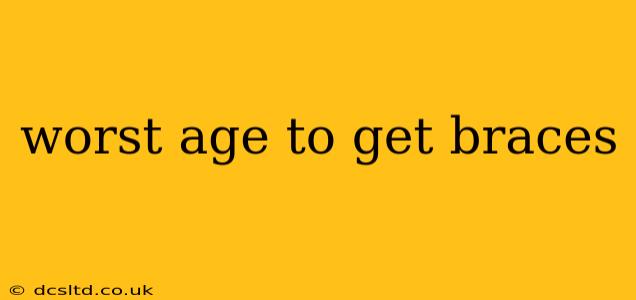There's a common misconception that there's a "worst" age to get braces. The truth is far more nuanced. While there are optimal times for orthodontic treatment, it's never too late to straighten your teeth and improve your oral health. This article will explore the factors influencing the ideal time for braces, address common concerns, and help you understand the possibilities at any age.
Is there an age limit for braces?
No, there isn't an age limit for getting braces. Orthodontic treatment can be beneficial for adults as well as children and adolescents. While younger patients often experience faster results, adult patients can achieve significant improvements in their smile and bite alignment. Modern orthodontic techniques are designed to accommodate patients of all ages.
What is the best age to get braces?
The American Association of Orthodontists recommends that children have their first orthodontic evaluation around age 7. This early assessment allows orthodontists to identify potential issues early on and intervene with early interceptive treatment if necessary. However, this doesn't mean that braces are only for children. Many adults seek orthodontic treatment to improve their smiles and address bite problems.
What are the advantages of getting braces at a younger age?
Getting braces at a younger age often has advantages. Children's jaws are still growing, allowing orthodontists to guide their growth and development more effectively. This can lead to shorter treatment times and potentially better overall results. Bone is also more malleable in younger individuals, allowing for easier tooth movement.
What are the challenges of getting braces as an older adult?
The primary challenge of getting braces as an older adult is that the bones and gums may not be as resilient as in younger individuals. This can sometimes lead to slightly longer treatment times or the need for more specialized procedures. However, advancements in orthodontic techniques have mitigated many of these concerns. Modern braces, like Invisalign, can be more comfortable for adults.
Are braces more expensive at older ages?
The cost of braces is not necessarily higher for older patients. The total cost depends more on the complexity of the case and the length of treatment required. A consultation with an orthodontist is crucial to determine an accurate estimate.
Can I get braces if I'm over 50?
Absolutely! It's never too late to improve your smile and oral health. Many adults over 50 successfully undergo orthodontic treatment. While the process may take slightly longer, the benefits of a straighter smile and improved bite are often worth it.
What are some considerations for adults getting braces?
Adults considering braces should discuss their concerns with an orthodontist. Factors like gum health, bone density, and overall health will be assessed to determine the best course of action. The orthodontist will also discuss treatment options and timelines.
How long does it take to get braces as an older adult?
The length of treatment for adults can vary. While it might be slightly longer than for younger individuals, advancements in orthodontic techniques have shortened treatment times significantly. The specific duration depends on the complexity of the case.
In Conclusion:
While there's no single "worst" age to get braces, an early evaluation is recommended to identify and address potential issues promptly. However, orthodontic treatment remains a viable option for individuals of all ages. Modern techniques and a collaborative approach with your orthodontist ensure successful results, regardless of age. Don't let age deter you from achieving the smile you've always wanted. Consult an orthodontist to discuss your individual needs and options.
